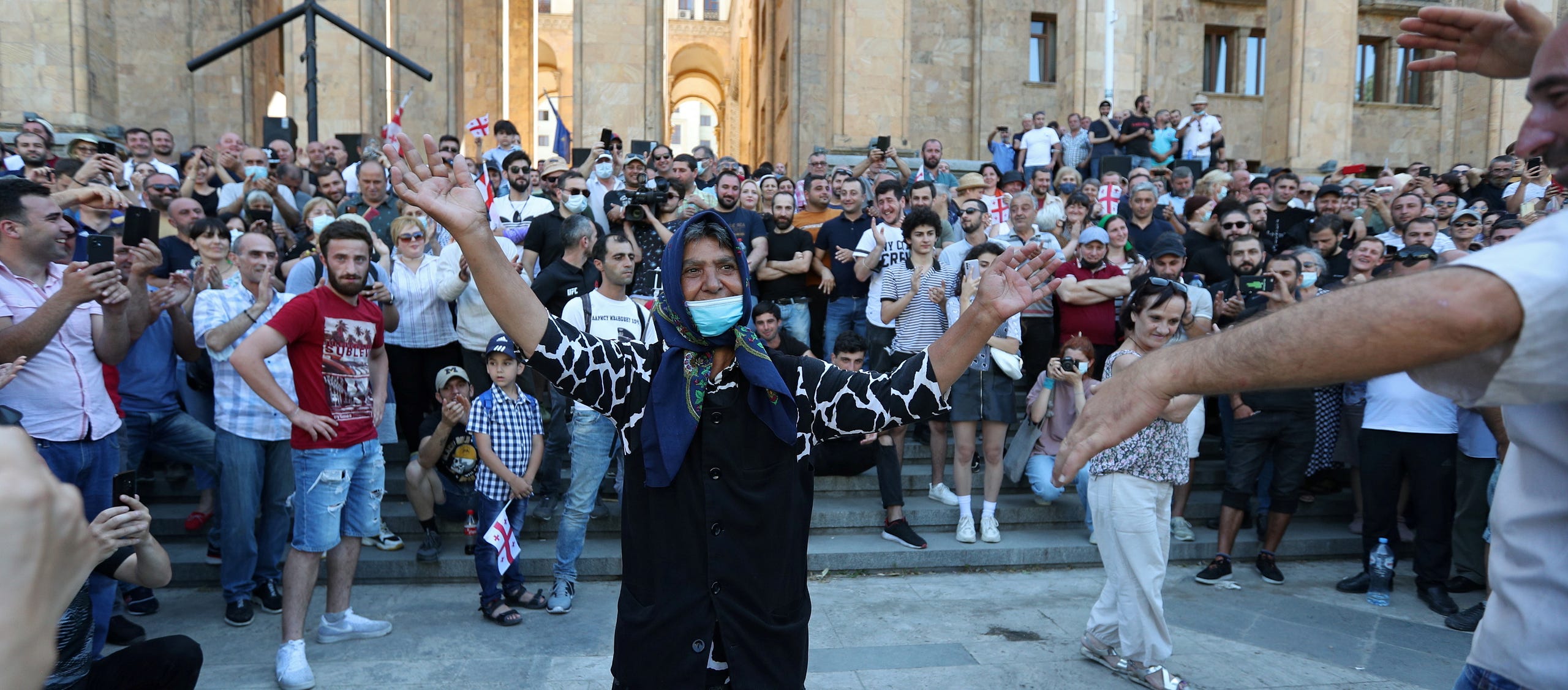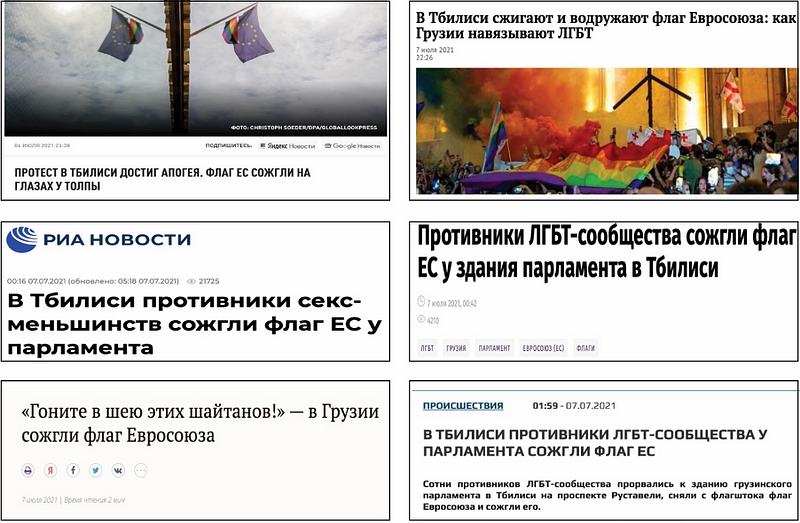Amid recent violence, narratives targeting Tbilisi Pride event spread online by domestic far-right groups and Russian propaganda outlets

By Givi Gigitashvili
In the days surrounding Georgia’s pro-LGBTQ March for Dignity, far-right Georgian groups echoed Russian propaganda outlets by targeting Tbilisi Pride and supporters of the march.
On July 5, the scheduled day of the March for Dignity, far-right groups held a counter demonstration in the Georgian capital of Tbilisi. As the demonstration turned violent and multiple journalists were attacked by an anti-Pride mob, Tbilisi Pride was forced to cancel the March. However, this did not stop the hate groups, which stormed the offices of Tbilisi Pride and civic activism organization the Shame Movement. As a result of this violence, more than fifty journalists were injured, one of whom, TV Pirveli cameraman Lekso Lashkarava, died from his injuries. Georgian nongovernmental organizations subsequently accused the government of not providing enough policemen to protect the journalists and other citizens from the violent groups.
Many of the same far-right groups and individuals who perpetrated the violence derive their animosity from Georgia’s perceived integration into Western institutions and their belief that Georgia should remain “pro-Georgian.” This sentiment, the rhetoric around it, and the violence associated with it ultimately serve to create distance between Georgia and the West, the latter of which is often compelled to condemn these same activities. The Kremlin, for its part, sees this distance as an ideal as a means of retaining a higher level of geopolitical influence in its near neighborhood.
The main organizer of the attacks on journalists and initiator of the assault on the activists’ offices was the far-right, pro-Kremlin organization Alt-Info. On July 14, police interrogated the organization’s leaders, who partially admitted that they had called for violence on July 5 but declined to take any responsibility for Lashkarava’s death. Other actors behind the violent protests were Guram Palavandishvili, leader of pro-Kremlin political party Georgian Idea, and Levan Vasadze, leader of another pro-Kremlin political party in Georgia “Unity, Essence, Hope.” Vasadze was in Russia for medical treatment when the violence unfolded but nevertheless pushed violent rhetoric online around the event.
Given the above, the claims mainly target Georgia’s Euro-Atlantic integration and promote the so-called “pro-Georgian” course. Links between the actors pushing these narratives with Kremlin-affiliated figures in Russia, as well as the visible convergence of the narratives themselves, indicate that they both serve a goal of eroding public trust in the West within Georgian society.
The DFRLab examined narratives pushed by Russian propagandist media, such as Eurasia Daily, Baltnews, and Regnum, about Tbilisi Pride Week and compared them with claims conveyed by the organizers of the anti-LGBT protests on July 5. The DFRLab found that both articulated similar claims and conspiracy theories about the event.
Narrative 1: the US Embassy in Georgia is standing behind Tbilisi Pride Week
One of the most prevalent narratives voiced by Russian propagandist media outlets and homophobic actors in Georgia alike is that the US embassy planned Tbilisi Pride Week, including by targeting US Ambassador to Georgia Kelly Degnan personally. An article published by pro-Kremlin Eurasia Daily claimed that the main supporter of the LGBTQ community in Georgia was not the Georgian people but Ambassador Degnan, and that the Georgian government was unable to resist US pressure to hold the March of Dignity. Meanwhile, Olga Skabeeva and Evgeniy Popov, TV hosts on Rossiya 1 channel, nurtured similar narratives and claimed that the United States is “trying to impose the ideas of tolerance, inclusiveness, and liberalism on Georgia… but apparently the nostalgic memory of the Soviet Union still exists in this ‘tiny Republic,’” and that Georgians prevented the United States from holding the pride parade. In a similar vein, News Front, a Kremlin-affiliated outlet known for spreading disinformation, asserted that organizing an LGBTQ parade in Tbilisi was “very important” for the US Department of State, because the United States is allegedly trying to bring “absolute liberals” to power in Georgia.
Far-right groups in Georgia pushed similar anti-US narratives ahead of Tbilisi Pride Week. Georgian Idea’s Guram Palavandishvili, for example, claimed that the United States has been pursuing “a moral occupation” of Georgia through its embassy, which he alleged was involved in organizing March for Dignity and wanted to “burn Georgia down.” Indeed, together with his supporters, Palavandishvili organized a demonstration in front of the US embassy, demanding that the US ambassador resign and leave Georgia. When it became known that TV Pirveli journalist Lashkarava had succumbed to his injuries after being beaten by a violent crowd, Vasadze put the responsibility on Ambassador Degnan’s shoulders, claiming that she had allegedly forced “various provocateurs” in Georgia to hold the March for Dignity. On July 3, two days before the march was to take place, Alliance of Patriots leader David Tarkhan Mouravi organized a gathering of party supporters and accused the US Agency for International Development and the Biden Administration of fighting the Georgian Orthodox Church.
At the same time, the US ambassador was not the only target of pro-Kremlin propaganda. For instance, Russian outlet Baltnews wrote that foreign ambassadors reacted harshly after the Georgian public supposedly came out against the March for Dignity, as these embassies were trying to dictate the decisions of a “sovereign and independent country.” Eurasia Daily argued that the joint statement by several embassies on the violence was not only unprecedented but also a breach of diplomatic protocol, which supposedly precludes telling a sovereign country what to do.
In a similar vein, the Patriarchate of the Georgian Orthodox Church released a statement on July 3 saying that it was unacceptable for certain embassies to interfere in Georgia’s internal affairs and “abuse their powers.” A host on a television program broadcast by far-right group Alt-Info reiterated the same narrative, claiming that foreign ambassadors need to respect Georgia’s sovereignty and allow it to decide on its own whether to allow an organized LGBTQ march.
Narrative 2: the European Union is attacking the Georgian Orthodox Church and traditional values
Ahead of the march, Russian propagandist media and far-right Georgian actors also doubled down on anti-EU narratives. Russian TV channel REN-TV asserted that Georgians have been brainwashed about the “great advantages of Western civilization” for 30 years already, but the violence in Tbilisi showed that Georgia’s national mentality and Christian moral norms are incompatible with “what the modern Western world calls ‘moral values.’” Baltnews portrayed it as a “tragedy” that the Western-oriented political elite in Georgia is “artificially dragging” people toward Europe but that the Georgian people should understand that European values are far from the historical ideals of Georgia. Regnum accused the West of insulting Georgia’s 1,500-year history, traditions, and culture by imposing LGBTQ pride on it, while Russian Duma Senator Vitaly Milov publicly expressed his satisfaction with the violence in Tbilisi and claimed that he watched with delight how the “citizens of Georgia defended their traditional values.”
Georgian far-right groups readily aligned with these anti-LGBTQ narratives. Besides the US embassy protest, Palavandishvili also organized a protest outside of the EU delegation office in Georgia, demanding that the head of the delegation, Carl Hartzell, “stop forcing the Georgian government to organize LGBTQ Pride” and reminding him that Georgia is an independent country. Similarly, Alt-Info’s TV hosts tried to convince their audience that that the EU had demanded not just that the March of Dignity be held but also that LGBTQ people be granted the right to marry and have children.
Fomented by these claims, amid anti-LGBTQ violence on July 5 and 6, far-right actors twice removed and burned an EU flag hanging in front of the Georgian Parliament. Zura Makharadze, an Alt-Info TV-host, was actively involved in both episodes, and Alt-Info also asked its followers on Telegram to amplify a video of the burning flag.
Multiple Russian propaganda outlets also reported on the episode. Aleksandr Dugin, a founder of the Eurasia Movement, shared a video of the burning flag on his personal Facebook wall with a description “Georgia I admire.” Moreover, the demonstration held by the violent groups in front of the Georgian Parliament was live-streamed on Kremlin-funded RT’s television channel on July 5.

Narrative 3: the Georgian opposition was behind Tbilisi Pride Week
Another narrative launched by the Russian media was that the Georgian opposition was behind the LGBT Pride Week. For instance, pro-Kremlin outlets Tsargrad and Eurasia Daily both wrote that Georgia’s “old guard of color revolutionaries” (i.e., the Georgian opposition) were behind the march and that the West uses the opposition to achieve its goals in Georgia. Riafan wrote that the march was organized by former Georgian President Mikhail Saakashvili with support from the United States. Similarly, Russian State Duma member Sergey Gavrilov claimed that Georgia’s “radical opposition” was standing behind the march because it is unable to achieve electoral success otherwise and needs to sow chaos to come back to power. (Gavrilov himself was the impetus for a major protest in Tbilisi in 2019, after breaking protocol while speaking at the Georgian parliament.)
The narrative around the opposition was readily embraced and replicated by Georgian government representatives as well. Most notably, Prime Minister Irakli Garibashvili himself claimed that “the radical opposition led by the former president Mikheil Saakashvili” was behind the march. According to the prime minister, Saakashvili allegedly wanted to induce civil unrest and chaos in the country, something that Garibashvili’s Georgian Dream party “would never allow.” Irakli Kobakhidze, chair of Georgian Dream, said that “Pride’s real goal was not to protect anyone’s rights” and that it was a political event with the (opposition) United National Movement political party supporting it.
The aforementioned narratives are not substantiated by facts and mainly served the purpose of mobilizing people against the West. Tbilisi Pride, a Georgia-based nongovernmental organization, planned the aborted March of Dignity, with no known direct assistance from foreign embassies. Indirect assistance did come in the form of statements of support, such as when, on June 28, members of the European Parliament called on Georgian authorities to the ensure safety of Tbilisi Pride Week participants and to protect their right to freedom of expression. This statement, perhaps unsurprisingly, was used by far-right groups to double down on anti-LGBTQ narratives, hoping to instill further anti-West sentiment within the large conservative swathe of Georgian society.
Givi Gigitashvili is a Research Assistant, Caucasus, with the Digital Forensic Research Lab.
Cite this case study:
Givi Gigitashvili, “Georgian far-right groups embrace anti-LGBTQ narratives pushed by pro-Russian media,” Digital Forensic Research Lab (DFRLab), July 26, 2021, https://medium.com/dfrlab/georgian-far-right-groups-embrace-anti-lgbtq-narratives-pushed-by-pro-russian-media-36f9e99a2561.
Follow along for more in-depth analysis from our #DigitalSherlocks.

